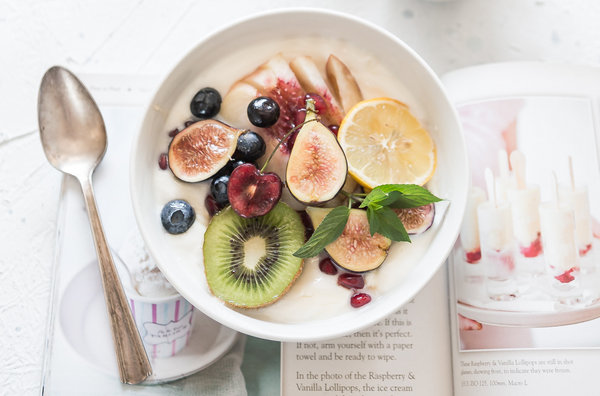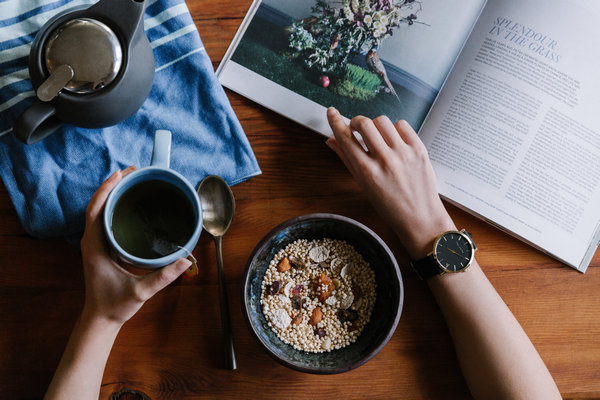Introduction to the importance of better health
Greetings and thank you for joining us on our practical guide to 10 Simple Habits for Better Health! In the fast-paced world we live in today, it can be difficult to make self-care a priority amidst the chaos of daily life. However, looking after ourselves is crucial if we want to live a happy and fulfilling life. Good health not only enhances our physical abilities but also improves mental clarity, increases energy levels, and boosts overall happiness. By implementing these ten simple habits into your routine, you can begin your journey towards a healthier and more vibrant lifestyle. So let’s dive right in and discover how small changes can lead to significant transformations.

Habit #1: Eat a Nutritious Breakfast
As the saying goes, breakfast is the most important meal of the day. Starting your day with a nutritious breakfast provides your body with the fuel it needs to function at its best. It also kickstarts your metabolism and helps regulate your blood sugar levels
Starting your day with a nutritious breakfast is the key to kickstarting your metabolism and providing your body with the energy it needs. A well-balanced breakfast sets the tone for the rest of your day, fueling you with essential nutrients and keeping those mid-morning cravings at bay.
When choosing what to eat for breakfast, opt for whole foods that are packed with fiber, protein, and healthy fats. Incorporating fruits, vegetables, whole grains, and lean proteins into your morning meal will keep you feeling satisfied and energized throughout the day.
Skipping breakfast or opting for sugary cereals or pastries may give you an initial burst of energy but can quickly lead to a crash later on. By nourishing yourself properly in the morning, you’ll be more focused and productive throughout the day.
If time is an issue in the mornings, try prepping some overnight oats or making a quick smoothie packed with greens and protein powder. Remember that small changes can make a big difference when it comes to improving your health!
So start tomorrow off right by fueling up on a nutrient-dense breakfast – trust me; your body will thank you!
Habit #2: Stay Hydrated Throughout the Day
Water is essential for our overall health and well-being. It plays a crucial role in maintaining bodily functions, regulating body temperature, flushing out toxins, and keeping our organs functioning optimally. That’s why it’s important to stay hydrated throughout the day.
When we don’t drink enough water, we can experience symptoms like fatigue, dizziness, headaches, and even difficulty concentrating. Dehydration can also impact our physical performance during exercise or daily activities.
To make sure you’re staying hydrated, try carrying a water bottle with you wherever you go. You can also set reminders on your phone or use apps that track your water intake. Additionally, incorporating hydrating foods into your diet such as fruits and vegetables can help boost hydration levels.
Remember that thirst isn’t always an accurate indicator of how hydrated you are. By the time you feel thirsty, your body may already be dehydrated. So it’s important to make drinking water throughout the day a habit rather than relying solely on thirst cues.
Incorporating this simple habit into your daily routine will have numerous benefits for your health. So grab a glass of water right now and start making hydration a priority!

Habit #3: Incorporate Exercise into Your Daily Routine
Exercise is not just about losing weight or gaining muscle; it’s about taking care of your overall health. By incorporating exercise into your daily routine, you can improve your cardiovascular health, boost your immune system, and increase your energy levels.
One way to make exercise a habit is by finding activities that you enjoy. Whether it’s going for a run in the park, attending a yoga class, or playing a sport with friends, find something that gets you moving and brings you joy. This will help ensure that you stick to your exercise routine long-term.
Another important aspect of incorporating exercise into your daily routine is consistency. It’s not enough to work out once in a while; regular physical activity is key for reaping the benefits. Aim for at least 30 minutes of moderate-intensity exercise most days of the week.
If time is an issue, try breaking up your workouts throughout the day. You can take short walks during breaks at work or do quick bodyweight exercises before bed. Remember that every little bit counts!
Don’t forget to listen to your body and rest when needed. Pushing yourself too hard without proper rest can lead to burnout or injury. Find balance in challenging yourself while also practicing self-care.
Incorporating exercise into our daily routines may seem daunting at first, but with small steps and consistent effort, it becomes easier over time. So lace up those sneakers and get moving! Your body will thank you for it!

Habit #4: Get Enough Sleep Every Night
Sleep is a vital aspect of our overall health and well-being. It plays a crucial role in supporting our immune system, cognitive functions, and emotional well-being. Unfortunately, in today’s fast-paced world, sleep often takes a backseat to other priorities. However, establishing healthy sleep habits can greatly improve your physical and mental health.
To ensure you get enough sleep every night, it’s important to establish a consistent bedtime routine. Create an environment that promotes relaxation by keeping your bedroom cool, dark, and quiet. Avoid stimulating activities such as using electronic devices or watching TV before bed.
Additionally, try to stick to a regular sleep schedule by going to bed and waking up at the same time each day. This helps regulate your body’s internal clock and improves the quality of your sleep.
If you struggle with falling asleep or staying asleep throughout the night, consider incorporating relaxation techniques into your bedtime routine. Deep breathing exercises or meditation can help calm the mind and promote better sleep.
Remember that getting enough restful sleep is not just about quantity but also quality. Aim for 7-9 hours of uninterrupted sleep each night to reap the full benefits of rejuvenation for both your body and mind.
Prioritizing adequate sleep may require some adjustments in your daily routine or lifestyle choices but investing in good-quality rest will pay off with improved energy levels, concentration abilities,and better overall health outcomes.

Habit #5: Practice Mindful Eating
In our fast-paced and hectic lives, it’s easy to fall into the trap of mindless eating. We often eat on the go or in front of screens, unaware of what we’re actually consuming. But by practicing mindful eating, we can develop a healthier relationship with food.
One way to practice mindful eating is to slow down and savor each bite. Take the time to truly taste your food, noticing its flavors, textures, and aromas. Engage all your senses in the experience.
Another important aspect of mindful eating is paying attention to your body’s hunger and fullness cues. Eat when you are hungry and stop when you are satisfied, rather than mindlessly finishing everything on your plate.
It’s also essential to be aware of emotional triggers that may lead us to overeat or make unhealthy choices. When we’re stressed or bored, we tend to turn towards food for comfort. By recognizing these triggers and finding alternative ways to cope with emotions, such as going for a walk or practicing deep breathing exercises, we can break free from unhealthy patterns.
Practicing gratitude for the nourishment our food provides is an integral part of mindful eating. Taking a moment before each meal to express gratitude not only enhances our connection with our meals but also helps us cultivate a positive mindset towards food.
By incorporating these habits into our daily lives, we can transform how we approach food and ultimately improve our overall health and well-being.
Habit #6: Reduce Stress Levels
In today’s fast-paced world, stress has become a common part of our lives. Whether it’s work deadlines, personal relationships, or daily responsibilities, stress can take a toll on both our physical and mental health. That’s why it’s important to make an effort to reduce stress levels and prioritize self-care.
One effective way to manage stress is through relaxation techniques such as deep breathing exercises or meditation. Taking just a few minutes each day to focus on your breath and clear your mind can help bring about a sense of calm and peace.
Another helpful habit for reducing stress is engaging in regular physical activity. Exercise releases endorphins, which are natural mood boosters that can counteract the negative effects of stress hormones in the body. Whether it’s going for a walk, hitting the gym, or practicing yoga, find an exercise routine that works for you.
Additionally, finding healthy ways to cope with stress is crucial. This may involve talking to a trusted friend or family member about your feelings, journaling your thoughts and emotions, or engaging in hobbies that bring you joy and relaxation.
Prioritizing self-care activities like getting enough sleep each night also plays a significant role in managing stress levels. When we are well-rested, we have more energy to face challenges head-on and are better equipped to handle stressful situations.
Remember that everyone experiences stress differently; what works for one person may not work for another. It’s important to find strategies that resonate with you personally and incorporate them into your daily routine consistently.
By incorporating these habits into your life – from practicing relaxation techniques to prioritizing self-care – you’ll be able to reduce overall stress levels and improve both your physical well-being and mental clarity.
Habit #7: Limit Alcohol and Tobacco Consumption
Taking care of our health involves making conscious choices about what we put into our bodies. One important habit to develop is limiting the consumption of alcohol and tobacco. While it’s no secret that excessive drinking and smoking can have detrimental effects on our health, many people still struggle with these habits.
Alcohol, when consumed in moderation, can be enjoyed responsibly. However, excessive drinking can lead to a wide range of health issues such as liver damage, increased risk of heart disease, and impaired cognitive function. It’s essential to know your limits and practice moderation when it comes to alcohol.
Similarly, tobacco use has long been linked to numerous serious health conditions including lung cancer, respiratory problems, and cardiovascular diseases. Quitting smoking or reducing tobacco intake not only improves your physical well-being but also contributes positively to your overall quality of life.
Breaking free from these habits may not be easy for everyone. Seeking support from friends, family members or professionals can make the process more manageable. Additionally, finding healthy alternatives like engaging in exercise or mindfulness activities can help redirect focus away from cravings.
Remember that every step towards reducing alcohol or tobacco consumption is a step towards better health! By consciously choosing healthier options for ourselves, we are investing in a brighter future filled with vitality and well-being.
Habit #8: Regular Health Check-ups
Regular health check-ups are an important habit to prioritize for better overall health. These check-ups allow you to monitor your well-being, identify any potential health issues early on, and take necessary preventive measures.
During a regular health check-up, your healthcare provider will assess various aspects of your physical and mental health. They may conduct routine tests such as blood pressure measurement, cholesterol screening, and body mass index calculation. Additionally, they may also perform specific screenings based on your age, gender, and medical history.
These check-ups provide an opportunity for open communication with your healthcare provider. You can discuss any concerns or symptoms you might be experiencing and receive appropriate guidance or treatment if needed. Regular visits also help build a strong doctor-patient relationship built on trust and understanding.
Moreover, these check-ups offer valuable insights into maintaining a healthy lifestyle by providing personalized advice regarding nutrition, exercise routines, stress management techniques, and more. By proactively addressing any potential health issues through regular check-ups, you can make informed decisions about improving your overall well-being.
Remember that prevention is always better than cure – catching problems early can lead to more effective treatments and potentially save lives! So make sure to schedule those regular health check-ups as part of your commitment to better overall health!
Habit #9: Screen Time Awareness
In today’s digital age, it’s hard to escape the screens that dominate our lives. From smartphones and tablets to laptops and TVs, we are constantly surrounded by technology. While these devices offer convenience and entertainment, excessive screen time can have negative impacts on our health.
Spending too much time in front of screens can lead to sedentary behavior, which is associated with a higher risk of obesity and other chronic diseases. Additionally, the blue light emitted by screens can disrupt our sleep patterns and cause eye strain.
To maintain better health, it’s important to be mindful of your screen time. Start by setting limits for yourself or your family members. Consider implementing “tech-free” zones or times during the day where you disconnect from screens completely.
Instead of mindlessly scrolling through social media or binge-watching shows, find alternative activities that promote physical activity or mental stimulation. Go for a walk outdoors, read a book, engage in hobbies or spend quality time with loved ones.
Remember to take regular breaks from screens throughout the day. Use these breaks as an opportunity to stretch your legs, rest your eyes and recharge mentally.
By being aware of your screen time habits and making conscious choices about how you engage with technology, you can improve your overall well-being.
Stay tuned for more tips on cultivating simple habits for better health!
Habit #10: Celebrate Progress, Not Perfection
In our quest for better health, it’s important to remember that perfection is not the goal. Life is full of ups and downs, and achieving perfect health may be unrealistic for most of us. Instead, focus on celebrating the progress you make along the way.
Each small step towards a healthier lifestyle should be acknowledged and celebrated. Whether it’s choosing a nutritious meal over fast food or completing your daily workout routine, these accomplishments deserve recognition. By acknowledging your efforts and applauding yourself for making positive changes, you will stay motivated and inspired to continue on this journey towards better health.
Remember that setbacks are inevitable. There will be days when you indulge in unhealthy habits or skip your exercise routine. It’s essential not to beat yourself up over these slip-ups but rather view them as learning opportunities. Use setbacks as moments to reflect on what went wrong and how you can prevent similar situations in the future.
By embracing a mindset of progress rather than perfection, you’ll cultivate self-compassion and resilience within yourself. This approach will help sustain long-term healthy habits instead of falling into an all-or-nothing mentality.
So celebrate each milestone achieved – whether big or small – because every step forward counts towards better health! Take pride in how far you’ve come while remaining open to growth and improvement along the way.
Incorporating these ten simple habits into your life can have a significant impact on your overall well-being. Remember that good health is not just about physical fitness; it encompasses mental, emotional, and spiritual aspects too.
Start by implementing one habit at a time until they become second nature to you. Small changes add up over time and lead to lasting results. So take charge of your health today with these practical guidelines for better well-being!
Now go ahead – eat nutrient-rich meals, hydrate regularly, move your body daily, prioritize sleep,
practice mindful eating, manage stress levels, limit alcohol and tobacco consumption,
schedule regular health check-ups, and celebrate every step towards better health! You’ve got this!
Conclusions of 10 Simple Habits for Better Health
In conclusion, incorporating these 10 simple habits into your daily routine can have a significant impact on your overall health and well-being. By making small changes and staying consistent, you can improve your physical, mental, and emotional health. Remember to listen to your body’s needs and make adjustments as necessary. With dedication and perseverance, you can cultivate a healthier lifestyle for yourself that will bring lasting benefits. So start implementing these habits today and see the positive difference it makes in your life.
